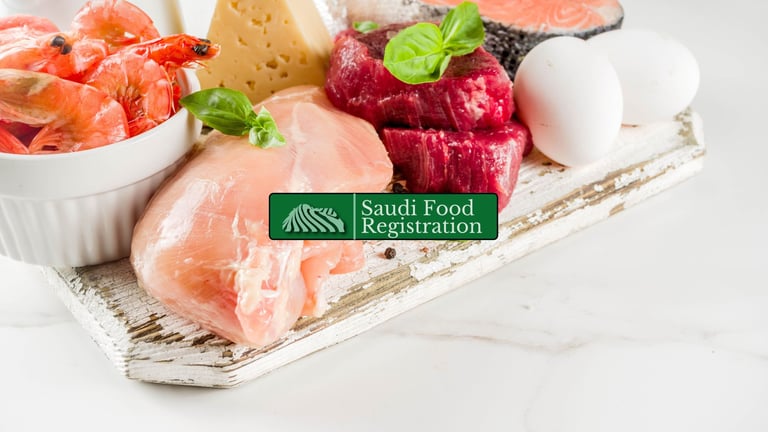Animal-Based: Halal Certification
Ensure Halal certification for gelatin, dairy, and meat-based ingredients in KSA. Get SFDA approval and avoid compliance risks with Saudi Food Registration.
2/28/20253 min read


Halal Certification for Animal-Based Ingredients in KSA:
Compliance & Approval Guide
How can food businesses ensure Halal compliance for gelatin, dairy, and meat products in Saudi Arabia?
If your business deals with animal-derived food ingredients, obtaining Halal certification is mandatory for regulatory approval and consumer trust.
In this guide, you'll find:
What is Halal certification for animal-based ingredients?
Why is Halal approval required for gelatin, dairy, and meat?
How do you get Halal certification in Saudi Arabia?
What causes Halal certification rejection, and how can businesses avoid it?
How much does Halal certification cost, and how long does it take?
What is Halal Certification for Animal-Based Ingredients?
Halal certification ensures that animal-based food ingredients comply with Islamic dietary laws under SFDA (Saudi Food & Drug Authority) and GSO (Gulf Standardization Organization) regulations.
This certification verifies that products are:
Free from non-Halal substances such as pork, alcohol, and cross-contaminated materials.
Sourced from Halal-certified animals and processed according to Islamic slaughtering standards.
Manufactured in facilities that prevent Halal contamination.
Why is Halal Certification Mandatory for Animal-Based Ingredients?
Saudi Arabia enforces strict Halal regulations on any product derived from animal sources to ensure compliance with Shariah law. Halal certification is essential for:
Food Manufacturers – Any business producing meat, dairy, gelatin-based confectionery, or processed foods.
Exporters & Importers – Companies bringing animal-based food ingredients into Saudi Arabia.
Dairy & Meat Processing Plants – Businesses involved in the handling, slaughtering, and processing of Halal-approved livestock.
Cosmetic & Pharmaceutical Manufacturers – Any capsules, skincare, or supplements containing gelatin or animal derivatives.
Step-by-Step Process to Obtain Halal Certification for Animal-Based Ingredients
Step 1: Source Halal-Certified Raw Materials
Verify that all animal-based ingredients are from Halal-approved suppliers.
Ensure livestock is slaughtered according to Islamic guidelines.
Confirm no cross-contamination with non-Halal ingredients.
Step 2: Apply for Halal Certification
Register with an SFDA-recognized Halal certification body.
Submit ingredient lists, supplier details, and manufacturing process reports.
Provide documentation on enzyme sources, gelatin origin, and animal derivatives.
Step 3: Factory Inspection & Audit
A Halal auditor inspects processing plants for compliance.
Facilities must prevent cross-contamination between Halal and non-Halal materials.
Sanitation procedures and production lines must align with Halal requirements.
Step 4: Product Testing & Laboratory Analysis
Products undergo scientific testing for alcohol content, animal-derived additives, and contamination risks.
Gelatin-based products require special verification of sourcing and processing.
Step 5: Certification Approval & Labeling Compliance
Once approved, the product receives the official Halal certification mark.
Businesses must comply with Halal labeling laws to sell in Saudi Arabia & the GCC.
Common Halal Certification Rejection Reasons & How to Avoid Them
Incomplete Documentation
Ensure ingredient declarations, supplier certificates, and processing details are complete before submission.
Cross-Contamination in Processing Facilities
Maintain strict segregation between Halal and non-Halal production lines.
Imported Ingredients Without Verified Halal Status
Source raw materials from SFDA-approved Halal suppliers and obtain official supplier certificates.
Improper Slaughtering Procedures
Ensure Islamic slaughtering verification for all meat-based ingredients.
How Much Does Halal Certification for Animal-Based Ingredients Cost?
Halal certification costs depend on product type, business size, and certification complexity.
Small businesses: SAR 15,000 - 25,000
Mid-sized manufacturers: SAR 30,000 - 50,000
Large processing facilities: SAR 50,000+ (varies based on product range & supply chain complexity)
Certification timeline:
Initial application & supplier verification – 2-4 weeks
Factory inspection & audits – 4-6 weeks
Final approval & certification issuance – 6-12 weeks
How Saudi Food Registration Can Help
Navigating Halal certification can be complex, but Saudi Food Registration provides:
Halal supplier verification – Assessing raw material sources for compliance.
Audit preparation & document review – Ensuring SFDA approval without delays.
Labeling compliance support – Helping businesses meet Saudi Halal labeling regulations.
Ongoing compliance monitoring – Supporting businesses with renewals and regulatory updates.
📌 Need help with Halal certification? Contact our specialists today or use our chatbot for instant support!
Related Reads:
GSO 2055-2 Halal Certification in Saudi Arabia – Understanding GCC-wide Halal regulations for food & beverages.
Registering Alternative Proteins in Saudi Arabia – How Halal certification impacts plant-based and novel protein approvals.
Food Labeling & Compliance in Saudi Arabia – Ensuring SFDA-compliant labeling for Halal-certified products.
Discover how Halal logistics certification ensures compliance in food storage & transportation under SFDA regulations.
Halal certification for processing aids guarantees SFDA compliance and food safety in KSA.
Why Halal Certification is Essential for Animal-Based Ingredients
If your business deals with gelatin, dairy, or meat-derived ingredients, obtaining Halal certification is a mandatory requirement for selling in Saudi Arabia and the GCC.
Ensures compliance with SFDA & GSO Halal laws
Prevents shipment rejections & regulatory penalties
Builds consumer trust & increases sales in Halal markets
💬 Need expert guidance?
Contact our team today or chat with us in the bottom right corner for fast compliance assistance!
